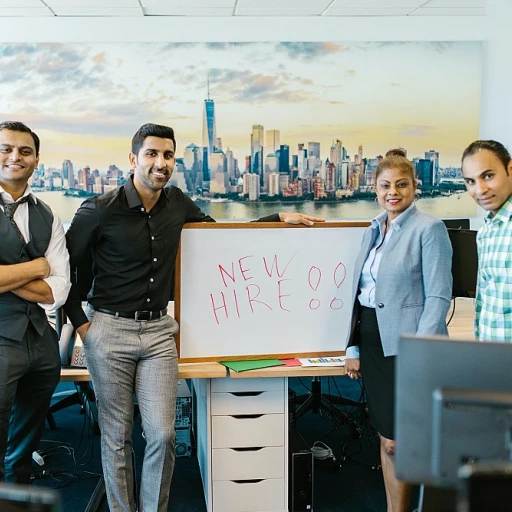Understanding the Motivation Behind Career Changes
The Drive to Change Careers in Your 30s
When you're in your 30s and thinking about changing your job, it’s not uncommon to feel a cocktail of emotions. There's the thrill of starting fresh but also the jitters about leaving behind the stability and routine of your current work. But why do many find themselves considering such a step? By the time you hit your 30s, you've gathered a decent amount of work experience. You've likely spent some years honing your skills in a particular field. But life’s unpredictable, and often, your interests and priorities evolve too. You might discover that the career path you once felt passionate about no longer provides the same spark or satisfaction. Consider Jenna, a marketing specialist in her early 30s. After almost a decade in digital marketing, she started feeling like she was just going through the motions. She’d grown weary of the endless cycle of campaigns and strategies that rarely lined up with her personal values. Her story isn't unique; many find themselves in careers that no longer align with their evolving professional goals or personal lives. Changing careers isn't just about fleeing discontent, though. For many, it’s about chasing a new passion. That excitement you felt at the beginning of your career might reignite with the idea of entering a different job field. Maybe you’ve developed a newfound interest in project management or teaching after years of community engagement or leading teams. Perhaps you've realized that your passion lies in a field unrelated to your college major or initial jobs. It's important to acknowledge these feelings and the motivations behind them. Are you driven by a desire for work that aligns more with your personal values? Seeking better work-life balance? Looking for a new challenge or growth opportunities that your current role can no longer provide? In your 30s, you've got both energy and experience—an ideal combination for stitching new interests with seasoned skills. Changing careers your way is about understanding why you feel the need to shift and figuring out the right direction to go. And if you find yourself asking big questions about life and career direction, know you're not alone. Others have faced similar junctions and made successful shifts. Curious about how others reimagined their career paths at various ages? Check out Reimagining Your Career Path at 50 for insights and inspiration. Realizing that career transitions are not bound by age can be empowering, and knowing others have navigated these waters successfully offers a beacon of hope and guidance. Remember, a career change doesn’t have to mean abandoning your experiences; it’s about redirecting them. As we move forward in this exploration of career change, from understanding your motivations to mapping out new paths, recognize the pivotal role your motivations play. This understanding will be the compass guiding you through assessing your skills and researching viable paths in subsequent discussions.Assessing Your Skills and Interests
Recognizing Your Strengths
Before jumping into a new career, it's important to take a moment and reflect on what you bring to the table. Your current job might not be fulfilling, but it has likely equipped you with a set of skills and experiences that are valuable in other fields. Think about the tasks you excel at and enjoy. Are you a natural leader? Do you thrive in creative environments? Understanding your strengths will help you identify the roles where you can shine.
Identifying Transferable Skills
One of the best things about changing careers is that you don’t have to start from scratch. Many skills you've honed over the years are applicable in various jobs. For instance, if you've been in project management, you likely have strong organizational and communication skills. These can be a huge asset in fields like digital marketing or even entry-level roles in a new industry. Make a list of your transferable skills to see how they align with potential career paths.
Aligning with Your Interests
While skills are essential, your interests play a crucial role in job satisfaction. Ask yourself what you are passionate about and how you can incorporate that into your work life. Maybe you've always had an interest in technology or helping people. Finding a career that aligns with your passions will not only make the work more enjoyable but also increase your motivation and performance.
Seeking Professional Guidance
Sometimes, an outside perspective can provide clarity. Career coaches or mentors can offer valuable insights into your skills and how they might fit into different industries. They can also help you identify areas where additional training might be beneficial. Whether it’s through a formal coaching session or an informal chat with someone you admire, seeking guidance can be a game-changer in your career development.
As you assess your skills and interests, remember that this is a time for self-discovery. Embrace the opportunity to learn more about yourself and what you truly want from your career. This self-awareness will be your compass as you explore new paths and make informed decisions about your future.
Researching Potential Career Paths
Explore New Opportunities and Align with Your Talents
Once you've got a handle on why you're ready to switch gears professionally and have identified what makes you tick, it's time to explore new opportunities that'll align with your core strengths. Changing your career doesn’t just happen overnight, and it's important to take the next steps thoughtfully. First, turn your sights to the job market. Dig into job boards, reach out to recruiters, or even sign up for digital marketing webinars. The aim is to get familiar with positions that pique your interest and see where your skills can best fit in. When scouting for potential career paths, always keep an open mind and explore entry level positions. It’s not uncommon to start afresh in a completely different field. Consider focusing on transferable skills. Maybe you've got project management experience or aced transferable skills like communication and problem-solving in your current job. These are solid assets across various careers your heart might be set on. Taking stock of these skills will not only broaden your career choice but also ease the transition. Diving into industries like digital marketing or tech? Some of them might require brushing up on new skills or getting additional qualifications. Don’t fret if training is needed, as many online platforms offer manageable learning paths for those busy with their current work or home life. It’s just about finding what works best for you. Remember, as you look at different career paths, you'll better understand where your hard work is likely to pay off. It’s about finding that sweet spot where passion meets potential. Need help? Connecting with others who've been through career development shifts or talking to a mentor can be enlightening. For more guidance and anecdotes from folks who've also walked this path, check out this blog post on overcoming the hurdles of shifting careers. This will give you insight into conquering the challenges of making career switches. Set your sights on future work experience that brings more fulfillment and less mundane Mondays. Discovering fresh fields isn't just about changing careers; it's the gateway to a more engaging professional life you'll love. Who knows? It might just be your best decision yet!Overcoming Financial and Emotional Challenges
Facing the Financial Hurdles
Changing your career in your 30s can feel like standing at the edge of a cliff, especially when it comes to finances. You might be leaving behind a steady paycheck, and that can be scary. But don't let the fear of the unknown stop you. Start by creating a financial cushion. Save up a few months' worth of expenses to give yourself some breathing room while you transition. This safety net will help you focus on your career change without constantly worrying about money.
Consider part-time work or freelancing in your current field while you make the switch. This way, you can maintain some income while exploring new opportunities. It's also a great chance to test the waters in your new field without fully committing. Remember, it's about balancing your current job with your new career path.
Emotional Rollercoaster
Let's be real: changing careers is not just a financial leap; it's an emotional one too. You might feel a mix of excitement and anxiety. You're not alone. Many people go through this emotional turmoil when changing careers. It's essential to acknowledge these feelings and not let them overwhelm you. Talk to others who have made similar changes. Their experiences can offer valuable insights and encouragement.
Consider seeking support from a career coach or therapist. They can provide guidance and help you manage the stress and emotions that come with such a significant change. Remember, it's okay to feel scared or uncertain. These feelings are part of the process and can be a sign that you're stepping out of your comfort zone, which is where growth happens.
Real-Life Stories
Take Sarah, for example. She was a teacher for ten years before deciding to switch to digital marketing. She felt stuck in her job and wanted a change. Sarah started by taking online courses to build her skills while still teaching. She saved money, cut down on unnecessary expenses, and slowly transitioned into her new role. Today, she's thriving in her new career and feels more fulfilled than ever.
Or consider Mike, who left his corporate job to pursue a career in project management. He faced skepticism from friends and family but stayed committed to his decision. By networking and attending industry events, Mike built connections that eventually led to his new job. His story shows that with determination and the right strategy, you can overcome the challenges of changing careers.
Taking the Leap
Overcoming financial and emotional challenges is part of the journey to a successful career change. It's about planning, preparing, and believing in your decision. With the right mindset and support, you can turn your career dreams into reality. Don't let fear hold you back; instead, let it fuel your determination to create the professional life you truly desire.




